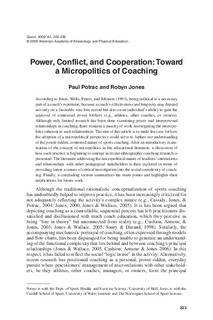| dc.description.abstract | According to Jones, Wells, Peters, and Johnson (1993), being political is a necessary
part of a coach’s repertoire, because a coach’s effectiveness and longevity may depend
not only on a favorable win–loss record but also on an individual’s ability to gain the
approval of contextual power brokers (e.g., athletes, other coaches, or owners).
Although only limited research has been done examining power and interpersonal
relationships in coaching, there remains a paucity of work investigating the micropolitics
inherent in such relationships. The aim of this article is to make the case for how
the adoption of a micropolitical perspective could serve to further our understanding
of the power-ridden, contested nature of sports coaching. After an introductory examination
of the concept of micropolitics in the educational literature, a discussion of
how such practice is beginning to emerge in recent ethnographic coaching research is
presented. The literature addressing the micropolitical nature of teachers’ interactions
and relationships with other pedagogical stakeholders is then explored in terms of
providing future avenues of critical investigation into the social complexity of coaching.
Finally, a concluding section summarizes the main points and highlights their
implications for future work. | en |
